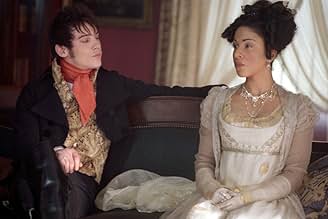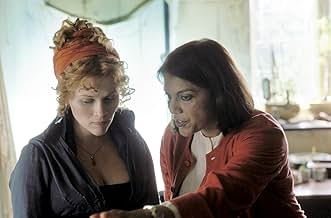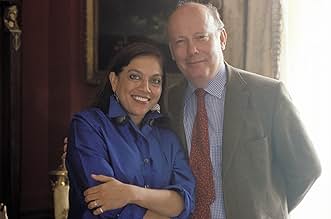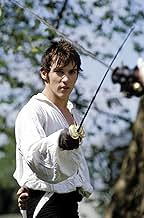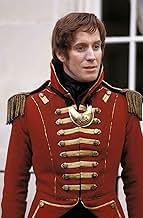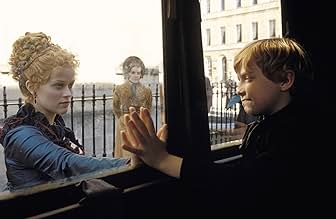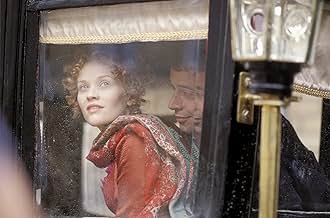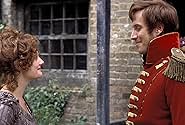IMDb रेटिंग
6.2/10
24 हज़ार
आपकी रेटिंग
लंदन में गरीब होकर पली-बढ़ी, बेकी शार्प ने अपनी गरीबी से त्रस्त पृष्ठभूमि को खारिज कर दिया और अपने सबसे अच्छे दोस्त अमेलिया सेडली के साथ सामाजिक सीढ़ी पर चढ़ाई की.लंदन में गरीब होकर पली-बढ़ी, बेकी शार्प ने अपनी गरीबी से त्रस्त पृष्ठभूमि को खारिज कर दिया और अपने सबसे अच्छे दोस्त अमेलिया सेडली के साथ सामाजिक सीढ़ी पर चढ़ाई की.लंदन में गरीब होकर पली-बढ़ी, बेकी शार्प ने अपनी गरीबी से त्रस्त पृष्ठभूमि को खारिज कर दिया और अपने सबसे अच्छे दोस्त अमेलिया सेडली के साथ सामाजिक सीढ़ी पर चढ़ाई की.
- पुरस्कार
- 2 जीत और कुल 5 नामांकन
Lillete Dubey
- Ms. Green
- (as Lillette Dubey)
फ़ीचर्ड समीक्षाएं
6=G=
"Vanity Fair" (2004) is an acceptable but abbreviated version of the classic Thackery Victorian period novel which tells of Becky Sharp (Witherspoon), who uses artifice and charm to climb from lowly governess to aristocrat, always able to find a suitable family of peerage or property to use as a rung in her ladder to the top in spite of the tribulations of the time. At just over two hours, this film cannot deal in depth with the many characters in the story and has to content itself with hitting the high points which make for a very condensed telling suited to those who only wish the flavor of the story. Those with a particular interest in Victorian pulp fiction or more expansive dramas should turn to the BBC's 1998 six hour miniseries which offers greater character depth, a presentation much more true to the period, and a very much better cast. (B-)
Believe it or not, I am under the age of 20 and have read this novel purely out of interest and found it to be an amazing piece of work. Thackeray's unique writing style in "Vanity Fair" is captivating. I saw the movie only a week after finishing the book, with the details fresh in my mind, to be immensely displeased. I have read a number of excellent comments that go into detail of the faults of the movie, so I plan to keep this brief for those wanting a shorter critique.
At least half of the characters were misrepresented. I believe the only two relatively-accurate main characters were Jos Sedley and Rawdon Crawley. Becky was completely dismantled into something with scarcely a semblance of what she is portrayed as in the book. The character Dobbin was undefined; George Osborne was snobbish instead of cocky; his rigid father suddenly became sympathetic (way too early and much too far); not to mention troves of other discrepancies. I understand the goal may have been to come up with a more abridged version, but there were changes made that had nothing to do with shortening the screenplay. Besides, there were a number of musical pieces that could have been cut in order to use the time more beneficially by preserving some of the integrity of the film.
Thackeray would have been appalled at this hack job.
Were it not for my love for time period films, and the possibility of enjoying this movie as something very separate from the book, I would not care to see it again. At least the filming was impressive, though that hardly makes up for the rest. The theatrical trailer is the best part of the movie.
At least half of the characters were misrepresented. I believe the only two relatively-accurate main characters were Jos Sedley and Rawdon Crawley. Becky was completely dismantled into something with scarcely a semblance of what she is portrayed as in the book. The character Dobbin was undefined; George Osborne was snobbish instead of cocky; his rigid father suddenly became sympathetic (way too early and much too far); not to mention troves of other discrepancies. I understand the goal may have been to come up with a more abridged version, but there were changes made that had nothing to do with shortening the screenplay. Besides, there were a number of musical pieces that could have been cut in order to use the time more beneficially by preserving some of the integrity of the film.
Thackeray would have been appalled at this hack job.
Were it not for my love for time period films, and the possibility of enjoying this movie as something very separate from the book, I would not care to see it again. At least the filming was impressive, though that hardly makes up for the rest. The theatrical trailer is the best part of the movie.
I had the somewhat unfortunate job of accompanying two teenage girls to my viewing of Vanity Fair. As any cinema attendee will know, there is nothing more irritating then two talkative teens, with the attention span of goldfish, chatting throughout the entire film. All their interest was well gone by the time Gabriel Byrne strutted onto the screen, and although it pains me to admit it, my interest had slowly subsided with theirs.
Although beautiful shots, skillful performances and magnificently designed sets came bountiful, there was still one vast absence that was so dearly missed. This was the charm, the charisma and the fascination that connects the audience with the characters. The scenes didn't fuse well and felt shabbily thrown together. Acknowledged events came as surprises and characters lost their appeal and distinctiveness. Becky Sharp, played by Reese Witherspoon, became aggravating and tedious, and any sympathy, understanding or patience for that matter, was lost to a plot so drawn and witless, it made 'Charlie's angels' seem thought provoking.
The charm and the magic of the William Makepeace Thackeray novel were forgotten in this drawn and soulless remake of a classic. Worth the watch for the costumes and set alone, but expect nothing more.
Although beautiful shots, skillful performances and magnificently designed sets came bountiful, there was still one vast absence that was so dearly missed. This was the charm, the charisma and the fascination that connects the audience with the characters. The scenes didn't fuse well and felt shabbily thrown together. Acknowledged events came as surprises and characters lost their appeal and distinctiveness. Becky Sharp, played by Reese Witherspoon, became aggravating and tedious, and any sympathy, understanding or patience for that matter, was lost to a plot so drawn and witless, it made 'Charlie's angels' seem thought provoking.
The charm and the magic of the William Makepeace Thackeray novel were forgotten in this drawn and soulless remake of a classic. Worth the watch for the costumes and set alone, but expect nothing more.
In many ways, director Mira Nair is a daring, imaginative choice to helm this latest film adaptation of William Makepeace Thackeray's classic novel of social mores in early 19th century England. But the end result of her vision is on the whole, rather disappointing. What could have been an energetic distillation of the book's themes turns into a lengthy episodic movie suffering from poor pacing and softened characters. It is a feast for the eyes though, as it appears Nair is intent on bringing her native India into the film as much as possible from the brightly colored period costumes to the contemporary-looking exotic dance at the Marquess of Steyne's party (with very anachronistic Rai music in the background) to the happy ending atop an elephant in Jodhpur. All these references remain true to the Calcutta-born author's story, and actually they feed into the English imagination of what India meant to them at the time. At the same time, the images are too overwhelming to make the basic story of Becky Sharp resonate as it should. Her evolution is the heart of the story, as she moves from finishing school outsider to resourceful governess to brave captain's wife to fallen woman in a casino. It's a long, rocky journey, almost too long for a 137-minute movie to bear as it turns out. Nair, however, also has a good handle on the comic banter among the characters, and it certainly helps that she has assembled a "Who's Who" of British stage and film in all the roles except the primary one.
As Becky, Reese Witherspoon gives it a valiant effort and perfects her British accent to Gwyneth Paltrow's standards, but she seems to be channeling a hybrid of her Elle Woods ("Legally Blonde") and her Tracy Flick (in Alexander Payne's "Election") by way of Kate Winslet in "Sense and Sensibility". When facing down her opponents in her climb upward, especially in the early scenes, the performance seems right. But when her character takes on Scarlett O'Hara dimensions in wartime suffering and acts of betrayal, she seems young and overwhelmed, and her reactions come across as too modern to be true to the character's evolution as intended. This anomaly results in a Becky Sharp who is not so much an ambitious social climber but a plucky heroine for the underclasses, a textbook example of a Tony Robbins motivational seminar. This transformation may seem endearing to those looking for nicely wrapped tales of triumph against all odds, but it doesn't lend credibility to the more pointed satire and harsher criticisms that Thackeray had in mind when he wrote the book. For example, Becky's gambler husband, Rawdon Crawley, is really more of a ne'er-do-well whose departure in the story should be viewed somewhat as relief, but as played by James Purefoy, he is a romantic figure who is guilt-ridden over his failure to provide for his family. The change could have been acceptable were it not for the fact that his character is discarded in an almost matter-of-fact way. The same sketchy treatment is given to Becky's only friend, Amelia Sedley, played by Romola Garai, who is set up as a contrast to Becky and comes across as a wet rag for much of the story. But the film transforms her into a brave widow whose romantic resolution at the end strains credibility. Somehow Purefoy and Garai acquit themselves admirably regardless.
There are many fine performances in the smaller roles. Worth mentioning are Jim Broadbent as roguish George Osborne's unforgiving father, Bob Hoskins as the clownishly pitiable Sir Pitt; Gabriel Byrne as the territorially devious Marquess of Steyne, and Geraldine McEwan's helium-voiced Lady Southdown. Best of all is the mordantly witty Eileen Atkins, who seems to understand the tone of Thackeray's story better than anyone else, and lends a dotty authority to the role of Aunt Mathilde, serving as the primary catalyst of Becky's social escalation much to her later regret. Great acting aside, the film's length does have a wearing effect since the climax does not bear the emotional weight of everything that has gone before it, and unfortunately the plot strands get wrapped up much too quickly at the end to make the story truly resonate. That's a shame since there is so much creative energy obviously at work here.
As Becky, Reese Witherspoon gives it a valiant effort and perfects her British accent to Gwyneth Paltrow's standards, but she seems to be channeling a hybrid of her Elle Woods ("Legally Blonde") and her Tracy Flick (in Alexander Payne's "Election") by way of Kate Winslet in "Sense and Sensibility". When facing down her opponents in her climb upward, especially in the early scenes, the performance seems right. But when her character takes on Scarlett O'Hara dimensions in wartime suffering and acts of betrayal, she seems young and overwhelmed, and her reactions come across as too modern to be true to the character's evolution as intended. This anomaly results in a Becky Sharp who is not so much an ambitious social climber but a plucky heroine for the underclasses, a textbook example of a Tony Robbins motivational seminar. This transformation may seem endearing to those looking for nicely wrapped tales of triumph against all odds, but it doesn't lend credibility to the more pointed satire and harsher criticisms that Thackeray had in mind when he wrote the book. For example, Becky's gambler husband, Rawdon Crawley, is really more of a ne'er-do-well whose departure in the story should be viewed somewhat as relief, but as played by James Purefoy, he is a romantic figure who is guilt-ridden over his failure to provide for his family. The change could have been acceptable were it not for the fact that his character is discarded in an almost matter-of-fact way. The same sketchy treatment is given to Becky's only friend, Amelia Sedley, played by Romola Garai, who is set up as a contrast to Becky and comes across as a wet rag for much of the story. But the film transforms her into a brave widow whose romantic resolution at the end strains credibility. Somehow Purefoy and Garai acquit themselves admirably regardless.
There are many fine performances in the smaller roles. Worth mentioning are Jim Broadbent as roguish George Osborne's unforgiving father, Bob Hoskins as the clownishly pitiable Sir Pitt; Gabriel Byrne as the territorially devious Marquess of Steyne, and Geraldine McEwan's helium-voiced Lady Southdown. Best of all is the mordantly witty Eileen Atkins, who seems to understand the tone of Thackeray's story better than anyone else, and lends a dotty authority to the role of Aunt Mathilde, serving as the primary catalyst of Becky's social escalation much to her later regret. Great acting aside, the film's length does have a wearing effect since the climax does not bear the emotional weight of everything that has gone before it, and unfortunately the plot strands get wrapped up much too quickly at the end to make the story truly resonate. That's a shame since there is so much creative energy obviously at work here.
This is an entertaining movie that goes over two hours, but I really don't understand why it was made. Sprawling stories spanning several decades with several subplots involving dozens of characters are totally defensible on the printed page, where we can always go back and remind ourselves which character is which and how this character is related to that one. But this type of thing makes no sense whatsoever in a film. Unless a viewer has a phenomenal memory, such a story on film invariably leads to confusion and to my asking myself, "now wait a minute, whose brother is this, and whose son?"
So that is one of the principal problems with this film.
There are several other problems as well. Reese Witherspoon is badly miscast. She simply lacks Becky Sharp's bite. In fact, the whole film lacks Thackeray's bite. Reese does a good job with the British accent, but it just doesn't work. She is just too American for the role. Weren't there any British actresses available, or were the producers just relying on Reese's star power? Reese is just too nice to play Becky.
It has often been said that Becky Sharp was the model for Scarlett O'Hara in "Gone With the Wind," although Margaret Mitchell denied this. Even so, I kept visualizing Vivien Leigh in this role and imagining how perfect she would have been. I think Mira Nair was thinking of GWTW as well, because there are several scenes in the film that are obvious homages to it. First there are the battle scenes during the Battle of Waterloo, followed by a panoramic view of the carnage following the battle, complete with corpses strewn all over the battlefield. This was an obvious homage to the crane shot over Atlanta in GWTW. The final fight between Becky and her husband reminded me of the final fight between Scarlett and Rhett in GWTW. I half expected the husband to say "Frankly, my dear, I don't give a damn."
Another flaw involves the Indian director Nair's inability to resist bringing in some Bollywood type scenes, particularly one involving Becky leading an Indian type dance, with Indian music, before the king, no less, and to thunderous applause.
And yet another thing: this film spans at least twenty, maybe twenty-five or thirty, years in Becky's life after she graduates from finishing school--I am not counting the one scene of her as a child--yet the character never ages. Neither do any of the other characters. Maybe the makeup staff went on strike?
But most of these problems won't even be noted by someone who hasn't read the book, so if you haven't, go ahead and see it; you'll probably be entertained. And if you are someone like me who loves the book, you may not be able to resist seeing it anyway. But Thackeray was never so soft.
So that is one of the principal problems with this film.
There are several other problems as well. Reese Witherspoon is badly miscast. She simply lacks Becky Sharp's bite. In fact, the whole film lacks Thackeray's bite. Reese does a good job with the British accent, but it just doesn't work. She is just too American for the role. Weren't there any British actresses available, or were the producers just relying on Reese's star power? Reese is just too nice to play Becky.
It has often been said that Becky Sharp was the model for Scarlett O'Hara in "Gone With the Wind," although Margaret Mitchell denied this. Even so, I kept visualizing Vivien Leigh in this role and imagining how perfect she would have been. I think Mira Nair was thinking of GWTW as well, because there are several scenes in the film that are obvious homages to it. First there are the battle scenes during the Battle of Waterloo, followed by a panoramic view of the carnage following the battle, complete with corpses strewn all over the battlefield. This was an obvious homage to the crane shot over Atlanta in GWTW. The final fight between Becky and her husband reminded me of the final fight between Scarlett and Rhett in GWTW. I half expected the husband to say "Frankly, my dear, I don't give a damn."
Another flaw involves the Indian director Nair's inability to resist bringing in some Bollywood type scenes, particularly one involving Becky leading an Indian type dance, with Indian music, before the king, no less, and to thunderous applause.
And yet another thing: this film spans at least twenty, maybe twenty-five or thirty, years in Becky's life after she graduates from finishing school--I am not counting the one scene of her as a child--yet the character never ages. Neither do any of the other characters. Maybe the makeup staff went on strike?
But most of these problems won't even be noted by someone who hasn't read the book, so if you haven't, go ahead and see it; you'll probably be entertained. And if you are someone like me who loves the book, you may not be able to resist seeing it anyway. But Thackeray was never so soft.
क्या आपको पता है
- ट्रिवियाAfter asking Reese Witherspoon to get pregnant for the role (as a joke, because she thought Reese was too thin), director Mira Nair was delighted when Witherspoon announced she was pregnant after all.
- गूफ़During the dance scene, a musician plays a metal flute, which was invented by Theobald Boehm around 1832.
- भाव
Mrs. Sedley: I thought her a mere social climber, but now I see she's a mountineer
- क्रेज़ी क्रेडिटBefore the credits start rolling the word "Alvida" (goodbye) appears in Urdu script. Beneath it is the following dedication: for our beloved Ammy Kulsum Alibhai 1927-2003
- साउंडट्रैकShe Walks in Beauty
Lyrics by Lord Byron (as Lord George Gordon Byron)
Music by Mychael Danna
Produced by Mychael Danna
Performed by Sissel (as Sissel)
Sissel appears courtesy of Universal Music, AS Norway and Stageway Talent, AS
टॉप पसंद
रेटिंग देने के लिए साइन-इन करें और वैयक्तिकृत सुझावों के लिए वॉचलिस्ट करें
- How long is Vanity Fair?Alexa द्वारा संचालित
विवरण
- रिलीज़ की तारीख़
- कंट्री ऑफ़ ओरिजिन
- भाषाएं
- इस रूप में भी जाना जाता है
- Vanidad
- फ़िल्माने की जगहें
- Holburne Museum of Art, Bath, Somerset, इंग्लैंड, यूनाइटेड किंगडम(Lord Steyne's residence)
- उत्पादन कंपनियां
- IMDbPro पर और कंपनी क्रेडिट देखें
बॉक्स ऑफ़िस
- बजट
- $2,30,00,000(अनुमानित)
- US और कनाडा में सकल
- $1,61,36,476
- US और कनाडा में पहले सप्ताह में कुल कमाई
- $48,00,000
- 5 सित॰ 2004
- दुनिया भर में सकल
- $1,94,63,185
- चलने की अवधि
- 2 घं 21 मि(141 min)
- रंग
- ध्वनि मिश्रण
- पक्ष अनुपात
- 2.35 : 1
इस पेज में योगदान दें
किसी बदलाव का सुझाव दें या अनुपलब्ध कॉन्टेंट जोड़ें


